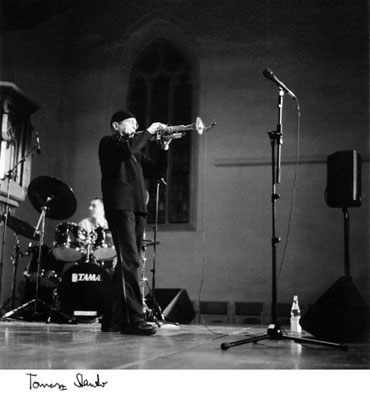God Under the First Amendment, part One: Rehnquist
Marci Hamilton,
commenting on FindLaw's "writ" page, describes as "indefensible" the Chief Justice's reasoning reaching his conclusion that the first amendment allows "under God" into the Pledge of allegiance:
According to Rehnquist, the phrase is fine as long as it means "that God has guided the destiny of the United States . . . or, that the United States exists under God's authority" - for after all, in his view, who could argue with those facts?
The answer is that these are not facts, but rather expressions of a religious worldview, and if that is what "under God" means it is--without question-- unconstitutional. In this religiously diverse country, many would take issue with his statements. They disagree with it because it endorses a particular religious worldview - which is based on belief, not fact. And this kind of endorsement of religion by the government is exactly what the Establishment Clause targets.
Let's back up a couple steps. Rehnquist begins his analysis of the establishment clause by looking at one precedent, the Kennedy decision in
Lee v. Weisman. There, a Rabbi led the audience of a middle school graduation in an invocation and benediction. For this prayer, a school official provided a pamphlet of guidelines for "Civic Occasions" recommending non-sectarian prayers promoting "inclusiveness and sensitivity."
The scope in which government may invoke religion, or make laws that respect religion in some way, has been fuzzy since the writing of the first amendment. In point of fact, the writers toiled over whether to insert into the phrase "respecting an establishment of
a religion," before penning the more general "establishment of religion." Since that early debate on whether to prohibit a national religion (thinking assuredly of England's Anglican Church), or to prohibit Congress from directing the souls of men by writing laws tending to do so, or, even, to carefully keep separate the spheres of church and state (Locke's view could also be found in those founders' minds), courts have struggled mightily to find a line that was not clearly drawn in the first place.
In
Lee, Justice Kennedy took his stab at what state actions constitute establishing religion. For Kennedy, the line exists where coercion sits. At a minimum, he writes (and I paraphrase), the Constitution guarantees that government may not coerce anyone to support or participate in religion
or its exercise...(for end of sentence, see below) .
In
Lee, the deciding factors for the majority were: 1) a state official directed the performance of a formal religious exercise and 2) student attendance and participation were "in a fair and real sense obligatory."
Here is Rehnquist's application of that case to the Pledge:
I do not believe that the phrase "under God" in the Pledge converts its recital into a "religious exercise" of the sort described in Lee. Instead, it is a declaration of belief in allegiance and loyalty to the United States flag and the Republic that it represents. The phrase "under God" is in no sense a prayer, nor an endorsement of any religion, but a simple recognition of the fact noted in H. R. Rep. No. 1693, at 2: "From the time of our earliest history our peoples and our institutions have reflected the traditional concept that our Nation was founded on a fundamental belief in God." Reciting the Pledge, or listening to others recite it, is a patriotic exercise, not a religious one; participants promise fidelity to our flag and our Nation, not to any particular God, faith, or church.
There may be others who disagree, not with the phrase "under God," but with the phrase "with liberty and justice for all." But surely that would not give such objectors the right to veto the holding of such a ceremony by those willing to participate.
The recital, in a patriotic ceremony pledging allegiance to the flag and to the Nation, of the descriptive phrase "under God" cannot possibly lead to the establishment of a religion, or anything like it.
I disagree with Hamilton's conclusion that this is indefensible. I think it is a better stance than O'Connor's concurrence, that we will soon visit. Rehnquist separates this case from
Lee on the "religious exercise" prong. Hamilton writes that Rehnquist allows "under God" as fact, when in fact it is Rehnquist's and the founders' world view. I see it a bit different. I think Rehnquist is saying that, as a matter of fact, most of our founders fundamentally believed in God--be they Deists or Christians (correct me if I'm wrong, but I think these were the two biggies amongst the men at work). As such, the Pledge, and other exercise, reflect on the God-presence in the minds of those that found our Nation.
And more simply, Rehnquist asserts, this just isn't religion- but patriotism. Fair enough. But wrong.
First, Rehnquist fails to read the rest of Kennedy's sentence in
Lee. It reads: "or otherwise act in any way which establishes a religion or religious faith, or tends to do so." Coercion via
Lee is broader than merely a prohibition on religious exercises. We must be wary of government actions tending to coerce by establishing religious faith.
Lee, then, takes the side of that broader Lockian view that fears government intrusion/contamination on religious belief.
Apart from his skinny reading of
Lee, his notion of recognizing our founders' beliefs improperly allows religious coercion. Obviously, all would agree that founding a particular church in D.C. to "celebrate" the sect of our founders would be improper. We would also agree, I hope, that a D.C. politician is perfectly free to talk about God, and rely on God in her decision-making. Except for those holdouts that think the first amendment merely proibits the Church of America, most scholrs and lay people generally feel the amendment prohibits government controlling our religious leanings, much as it cannot control what we say (though both these notions are ultimately wrong--the government can prevent both speech and religious excercise under a variety of circumstances). Anyhow, for Rehnquist, the Pledge is one of many small recognitions of the pervasive belief in God in our country. And a recognition, he argues, is far from religious-indoctrination. But, such a recognition should not escape coercion. Rather, it is peer pressure in the extreme.
Of course, if I write a post urging us all toward a particular religious view, I do not violate the first amendment. But if I write a law requiring you to recognize that there is a God under whom sits our country, I am demanding you recognize a fact that tends to religion. Yes, the Pledge is patriotic. Yes, it is directed to our flag. But, in inserting those religious words, the Pledge turns the flag into a religious emblem. The flag represents, since the mid-50s, the positive belief in monotheism. You can say the Pledge, intact, with that belief or with empty speech....or you can close your lips. It does not matter. The state is telling you what we think, what the country mostly thinks, and what your founders' thought. If you don't think likewise, you can seal those lips and wonder whether, in not being able to pledge your own flag, you are really American.
That is coercion.







